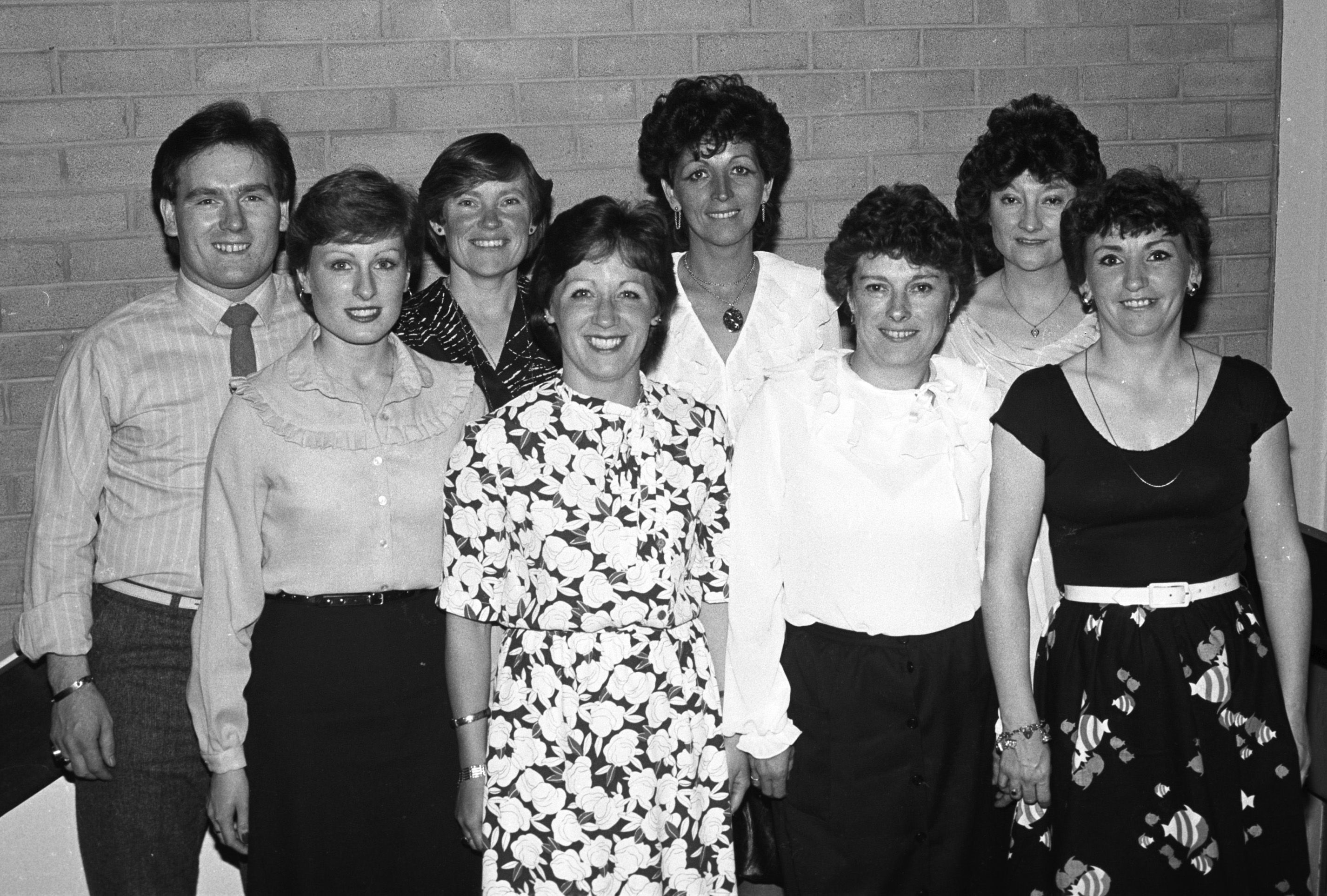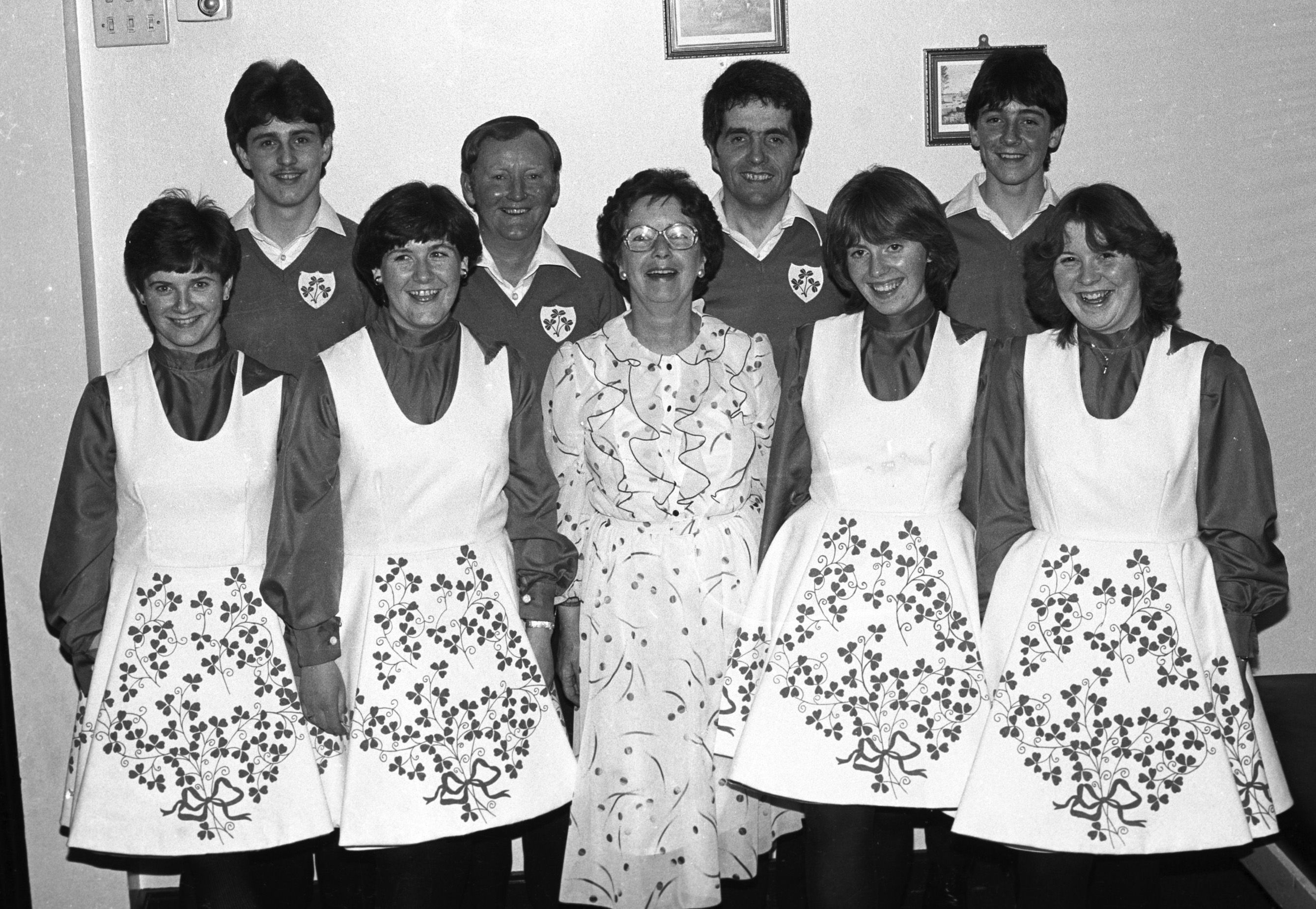WE look back at the stories that were making the headlines this week in the Andersonstown News in 1982
Colette Herald, Maureen Lyness, Pat Lyttle, Angela and Peter Kane, Eilis McGranaghan, Geraldine Mulholland and Marie Hughes at McAleer Dancers reunion in the Thrupenny Bit
THE 300-plus republican prisoners still on protest in the H-Blocks have announced that they will be setting up branches of Conradh na Gaeilge shortly.
Conradh, also known as the Gaelic League, is the country’s largest language organisation, and has always championed the demands of the H-Block inmates.
The cultural PRO of the men has also called on all Irish language organisations to support them in the battle to obtain recognition of Gaelic as their ordinary tongue within the prison. A blanket ban on letters in our out, novels, cards and newspapers in Gaelic, is being imposed by Long Kesh authorities. The only literature in Irish allowed is the Bible. It is also forbidden to speak Irish during a visit and the breaking of this rule has resulted in visits being terminated early. These measures apply even where parents brought up their son through Gaelic.
During the no-wash and blanket protests, prisoners learnt Gaelic in ‘classes’ where words were shouted from cell to cell and scrawled on the walls. So great in fact is the enthusiasm for the language in the H-Blocks that today in many wings, it is the primary language spoken.
The political prisoners are appealing to the prominent Irish language company Gael Linn to send examiners to the camp so what the men can sit oral examinations for the silver and gold fainnes. Failing this, the men are asking Gael Linn to appoint examiners from among the prisoners themselves.
The republican prisoners are in the process of completing the necessary forms for membership of Conradh na Galeilge. As soon as arrangements are finalised the men will announce the name of their new branch and define what they see as their role within the League.
A request by the PoWs that they be admitted to a ‘national competition, Glór nan Gael, to determine the area or town which does the most to promote the Irish culture, still stands. Earlier this year, the men’s request was rejected but after enquiries by Belfast Gaelgeoirs, it was conceded that the H-Blocks could enter such a competition as part of Lisburn.
Speaking yesterday, the Gaelic League’s General Secretary, Seán Mac Mathúna said that there would be “no problem in admitting a prisoners’ branch to the Conradh”.
“Until recently there had been a branch in Portlaoise Prison,” he added.
Mr Mac Mathúna also revealed the Conradh is corresponding with the British Home Office on the ban on Irish books in prisons here.
Saint John the Baptist Primary School won the Northern Ireland Primary Schools Soccer Cup
Redecoration grants will not be deducted from those in arrears
IN a letter to Fra Donnelly of the New Beechmount Housng Committee, the Housing Executive Chairman, Charles Brett, has announced a major change in housing policy.
The letter came in reply to a complaint by the Housing Committee about an Executive policy whereby redecoration grants rather than being paid to tenants were being deducted from their arrears. Locals, many of whom are in debt, feared not receive any grants to repair damage caused by the installation of solid fires going on at present.
In his reply Mr Brett states that “The Board reviewed this policy in November 1981 and agreed in principle that in cases of hardship, payment due to tenants to recompenses for expenditure such as redecoration should be released even if the rent account is in arrears.”
The only condition attached in this decision is that the resident be making an effort to clear his or her arrears. This should not prove an obstacle in Beechmount, however, as most people in arrears get rent payments deducted from their supplementary benefits.
The New Beechmount Housing Committee is, a spokesman said, giving the change in policy “a guarded welcome”.
The Committee will be monitoring the functioning of the new policy in coming months.
Alice Kiernan (née McAleer) with dancers from Newry Shamrock, All Ireland winners, at McAleer Dancers reunion in the Thrupenny Bit
Editorial: Double standards over Pope’s visit to Britain calls
THE last minute impassioned plea by Cardinal Ó Fiaich that the Pope should visit Britain, contrasts markedly with his meek acceptance in 1979, that the Pope should not visit his beleaguered followers in the Six Counties.
Many people at that time considered the Pope’s decision to be tantamount to moral cowardice and a slight on the Catholics of the Six Counties, hundreds of whom had been killed for no other reason than than they were Roman Catholics. In the more genteel sections of our society and especially in the ecumenical atmosphere of St Anne’s Cathedral or the Servite Priory in Benburb, it is not considered “naive” or polite to say such things, but they are nevertheless true. The Pope opted for sanctions against the Northern Catholics because killing was going on in their community, event though it was mainly directed against themselves, as statistics show.
He himself said in Drogheda that “murder should not be called by any other name than murder”, or as the Iron Lady herself put it, “A crime is a crime, is a crime.”
How much more then is the reason for the Pope not visiting England, which has just caused the deaths of 400 sailors (as they slept in their hammocks) onboard the General Belgrano and which is preparing to kill hundreds more if necessary to save the face of Margaret Thatcher’s political and military junta (albert a democratic one.)
If the Pope visits England at present, even if the Falkland crisis blows over, and while the bodies of the Belgrano sailors are still being washed ashore, his stance as a spiritual leader and apostle of peace will have failed even lower in the estimation of Northern Catholics.
Patricia McAllister, Mary Anderson, Mona McMullan, Sally Carson, Gertie Mulligan, Geraldine Watson and Jacinta Murray at McAleer Dancers reunion in the Thrupenny Bit







